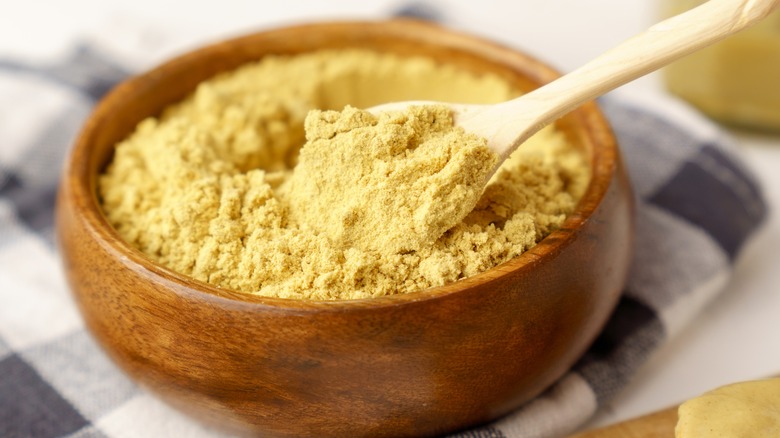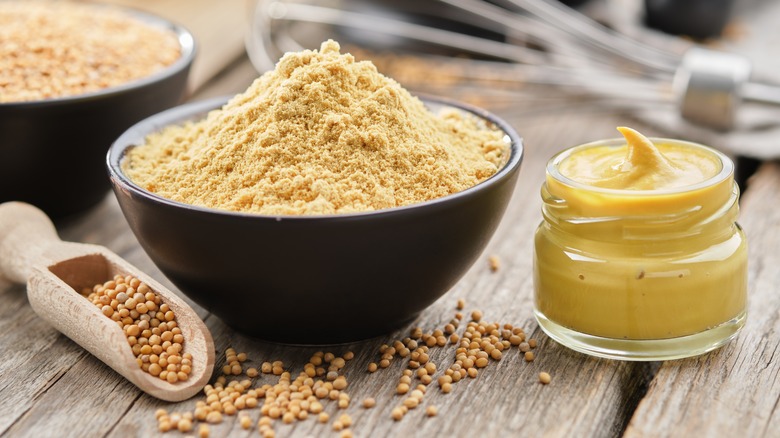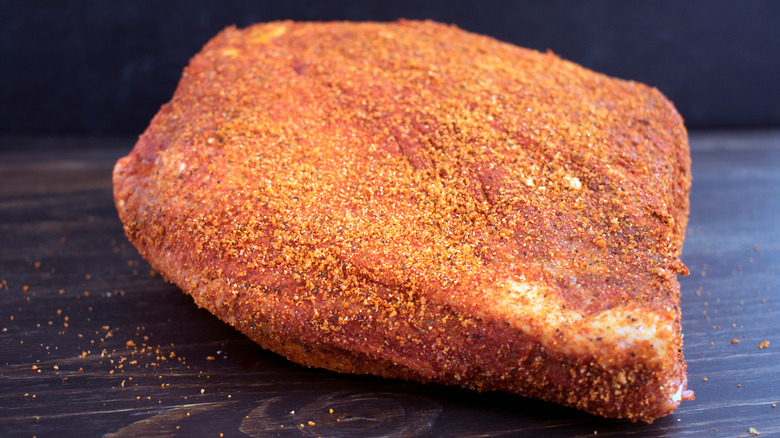What To Keep In Mind When Using Ground Mustard
Ground mustard (or mustard powder) is the pulverized form of the mustards you keep in your fridge and use on your hot dogs. When cooking with mustard powder, it's a versatile ingredient that can be used in every part of the meal, from bringing a spicy kick to marinades and rubs to adding some zest to mashed potatoes and other vegetables. There is, however, one important thing to keep in mind, and that's the fact that ground mustard has a much stronger flavor than the mustard you buy mixed and prepared into that tangy yellow sauce that everyone loves.
That means a few things. While you should definitely keep it on hand and you can use it in recipes in place of prepared mustard, you'll need to take the powder's strength into account. You'll need to adjust the recipe accordingly, or risk the whole thing turning out too mustardy and bitter.
If you're using that ground mustard not in a recipe but to make a mustard for hot dogs or sausage, there's a trick here, too. What you mix it with is important, and this is a great opportunity to experiment with other liquids to create a mustard substitute that might end up being your favorite go-to condiment... even when you're not out of the store-bought stuff.
Here's how to use strong ground mustard
There are a wide variety of different types of mustard, from the all-American yellow to the classy Dijon and the versatile whole grain mustard. That said, here's some food for thought: The ground mustard you're keeping on hand for marinades and rubs has a flavor that's pretty close to prepared Dijon mustard. It is, however, stronger. Why? Ground mustard powder is only one of a number of ingredients in prepared, store-bought mustards, and those other ingredients temper the clean-out-your-sinuses ability of the straight powder.
That means that making a saucy condiment from ground mustard isn't as simple as adding water and being done with it. You're going to need to add other ingredients to temper the raw heat, and that means experimenting with liquids like white vinegar or apple cider vinegar. But the fun thing is that this is a way to get creative with condiments: Try using beer, champagne, or wine for the liquid, and trust us when we say that this is a brilliant way to use up that last little bit of white wine that's left in the bottle.
Other spices will help soften the occasionally overpowering taste of ground mustard, too. Garlic, turmeric, paprika, honey, salt, sugar, and cayenne powder are all great options to add to round out those flavors, and adding the powder to mayonnaise is also a great way to tone down the bite.
There are a ton of uses for ground mustard that capitalize on strength
The first rule of working with ground mustard is to remember that it's incredibly strong, and that's not necessarily a bad thing. Some of the best uses for ground mustard are in recipes that call for just a dash of heat and that have other ingredients that can mask any bitterness. One of the most versatile uses is in a marinade for meats, because ground mustard can be used to add a layer of lovely spice to any protein, whether you're barbecuing beef or cooking a delicate fish.
Similarly, a sprinkle works well on a variety of veggies. That's true whether you add a dash to raw veggies before popping them in the oven to roast, or if you use that mustard powder to make a spicy dip to go alongside a raw vegetable platter. It works so well in dips because of another thing you might want to keep in mind: Adding mustard powder to creamy or high-fat substances goes a long way in toning down the bitterness, which means it's great in dishes like deviled eggs, potato salads, and sprinkled on sandwiches like a BLT.
And most surprising of all, ground mustard actually works really well in some cocktails. The spicy heat can mingle with the forward flavors of a spiced rum cocktail, and it's also exactly what your favorite bloody mary recipe calls for. Who would have thought?


